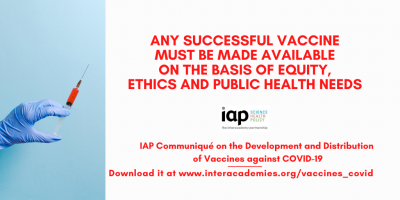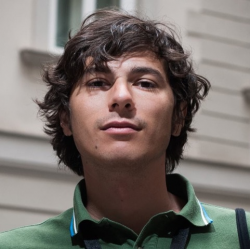


TRIESTE, ITALY. No corners should be cut in assessing the safety and efficacy of any candidate COVID-19 vaccines. We must oppose the misinformation espoused by the vocal anti-vaccine lobbies. Any successful vaccine must be made available on the basis of equity, ethics and public health needs. These are crucial actions in the global fight against COVID-19 according to the InterAcademy Partnership (IAP), a global network of 140 academies whose academy members constitute more than 30,000 leading scientists, engineers and health professionals in over 100 countries.
The new IAP Communiqué on the Development and Distribution of Vaccines against COVID-19 highlights the fact that while public health tools such as physical distancing, wearing of masks and proper hygiene, along with testing and tracing, have been shown to help control the spread of COVID-19, it is widely recognized that vaccines will be essential to our ability to control the current pandemic, protect against likely future outbreaks and allow populations to return to their daily lives.
Working across sectors, billions of dollars are being invested in COVID-19 vaccine research, which is being carried out at an unprecedented rate. According to the WHO, as of 3 September 2020, there are 34 candidate vaccines in clinical evaluation and an additional 142 in preclinical evaluation. But, despite all the news reports, currently there are no officially approved COVID-19 vaccines available anywhere in the world.
“The race for a COVID-19 vaccine must not be allowed to hurt the public: while there is a pressing need to accelerate this process to the greatest degree possible, there are also grave dangers if corners are cut. The standard phases of clinical vaccine trials must proceed with appropriate scientific rigour, in particular the collection of the robust evidence needed to demonstrate large-scale safety and efficacy,” said IAP President Volker ter Meulen, a prominent virologist.
“Confidence and trust in tried-and- tested vaccines have already been compromised by the anti-vaxx movement. We must ensure an open, high integrity, science-driven process for the development and review of COVID-19 vaccines so that doubts will not be fueled about the safety of new COVID-19 vaccine, which could compromise the health of people, risk prolonging the COVID-19 pandemic and potentially further undermine confidence in the vaccine enterprise overall,” said IAP Health Co-chair Margaret (Peggy) Hamburg, who in 2009 was appointed by President Barack Obama to serve as Commissioner of the U.S. Food and Drug Administration (FDA).
“So-called ‘vaccine nationalism’, or the buying-up in advance of stocks of future vaccines exclusively for national use is unacceptable, and access to the vaccine by countries and individuals should be based on need and not on ability to pay,” said IAP Science Co-chair Krishan Lal, Past President of the Indian National Science Academy (INSA).
The IAP Communiqué on the Development and Distribution of Vaccines against COVID-19 (available online here) was officially launched at the EuroScience Open Forum (ESOF), the biennial, pan-European, general science conference dedicated to scientific research and innovation, that in 2020 took place in Trieste, Italy, from 2 to 6 September.
The full text of the IAP Communiqué on the Development and Distribution of Vaccines against COVID-19 is available at www.interacademies.org/vaccines_covid.
The new Communiqué was signed by the Steering Committee members of the InterAcademy Partnership:
Volker ter Meulen, IAP President, and Past President of German Academy of Sciences Leopoldina
Depei Liu, president and co-chair IAP-Health, and former Vice President of the Chinese Academy of Engineering
Richard Catlow, co-chair, IAP-Policy, and Foreign Secretary of The Royal Society
Masresha Fatene, co-chair, IAP-Policy, and Executive Director of the Ethiopian Academy of Sciences
Margaret Hamburg, co-chair, IAP-Health, and Foreign Secretary of The US National Academy of Medicine
Krishan Lal, co-chair, IAP-Science, and Past President of The Indian National Science Academy (INSA)
Cherry Murray, co-chair, IAP-Science, and Member of both the US National Academy of Sciences and US National Academy of Engineering
NOTE TO EDITORS: Under the umbrella of the InterAcademy Partnership (IAP), 140 national, regional and global member academies work together to support the vital role of science in seeking evidence-based solutions to the world’s most challenging problems. In particular, IAP harnesses the expertise of the world's scientific, medical and engineering leaders to advance sound policies, improve public health, promote excellence in science education, and achieve other critical development goals.
More information about IAP can be found at www.interacademies.org and on Twitter at @IAPartnership.
